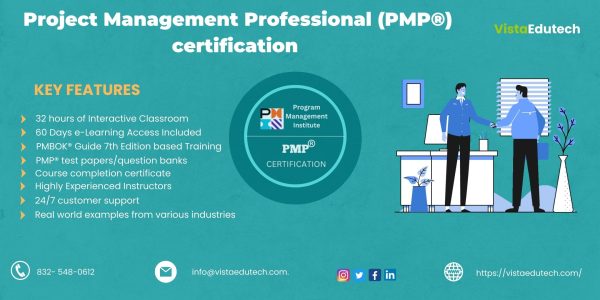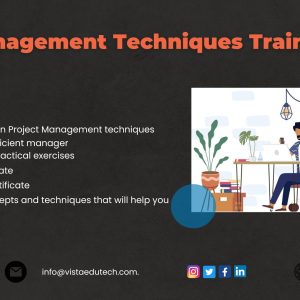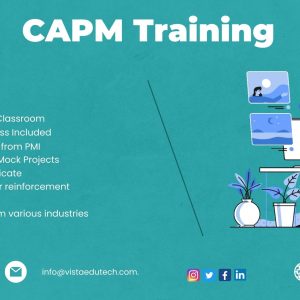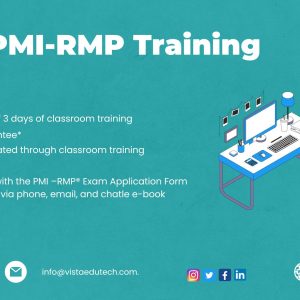Project Management Professional (PMP®) Certification Training
Ready to elevate your career in project management? Our PMP® Certification Training is designed for professionals who lead high-stakes projects and want to deliver strategic value to their organizations.
Recognized globally and backed by the Project Management Institute (PMI), the PMP® certification is one of the most prestigious credentials for project leaders. This training will sharpen your leadership skills, boost your résumé, and unlock career opportunities in top companies around the world.
Aligned with the PMBOK® Guide – Seventh Edition and PMI’s latest Exam Content Outline (ECO), our program thoroughly prepares you in core project management domains, including integration, scope, schedule, cost, quality, resource, risk, procurement, and stakeholder management.
Led by experienced instructors with practical expertise, this training blends real-world project scenarios with test-ready strategies—giving you the edge to pass the PMP® exam on your first attempt. Whether you work in tech, healthcare, finance, or engineering, this course equips you to thrive in any project-driven environment.
Why PMP® Now?
According to PMI’s latest Earning Power Salary Survey (12th Edition), PMP® certified professionals earn 16% more globally—and up to 32% more in the U.S.—than non-certified peers. There’s never been a better time to invest in your future.
Key Features of PMP® Certification Training
-
32 Hours of Live Instructor-Led Training
-
Lifetime Access to Self-Paced eLearning
-
Based on PMBOK® Guide – 7th Edition
-
35 Contact Hours Certificate Included
-
4 Full-Length Mock Exams (800+ Practice Questions)
-
Exam Application Assistance & Personalized Support
-
Real-World Case Studies & Chapter-End Quizzes
-
Taught by Expert PMP®-Certified Trainers
-
24/7 Learner Support
-
Money-Back Guarantee (T&C Apply)
Course Objectives
Our PMP® training is structured to give you not only the certification but the confidence to apply your skills in complex, real-world projects.
Core Objectives:
-
Master PMI® Standards and Best Practices
Learn how to apply the PMI-defined principles in a variety of project scenarios, across domains and industries. -
Fulfill PMP® Exam Eligibility
Complete the 35 contact hours of project management education required by PMI®. -
Get Exam-Ready
Understand the format and rigor of the current PMP® exam:-
180 questions (175 scored + 5 pretest)
-
230 minutes with two 10-minute breaks
-
Mix of multiple-choice, multiple-response, hotspot, matching, and fill-in-the-blank
-
-
Deep Dive into the 3 PMP® Exam Domains
-
People (42%) – Leadership, team building, conflict resolution
-
Process (50%) – Scope, cost, schedule, and risk planning
-
Business Environment (8%) – Strategic alignment, value realization
-
-
Integrate Agile and Hybrid Approaches
With nearly 50% of the exam focused on agile or hybrid methodologies, you’ll gain practical experience in iterative delivery models. -
Strategic Project Thinking
Move beyond tactical execution—learn how to align project goals with organizational strategy. -
Stay Current With PMI® Updates
The current exam format remains valid through 2025, so now is the time to prepare before the anticipated PMBOK® 8th Edition releases.
Eligibility Requirements
To apply for the PMP® certification, you must meet both education and experience criteria:
| Education Level | Project Experience (within past 8 years) | Training Requirement |
|---|---|---|
| Four-Year Degree | 36 months | 35 hours or CAPM® |
| High School Diploma or Associate | 60 months | 35 hours or CAPM® |
Not yet eligible? Check out our CAPM® Certification Training to get started.
Who Should Attend
This course is ideal for professionals involved in managing or leading projects:
-
Project Managers & Team Leaders
-
Program & Portfolio Managers
-
Product Owners & Product Managers
-
Project Analysts & Coordinators
-
PMO Leads, Consultants, and Sponsors
Frequently Asked Questions (FAQ)
What is the PMP® Handbook?
It’s a comprehensive guide published by PMI® that outlines policies, exam eligibility, application procedures, and renewal requirements.
What’s the current PMP® exam structure?
-
180 questions total (175 scored, 5 unscored)
-
230 minutes total time
-
2 breaks of 10 minutes
-
Scenario-based questions across multiple formats
What are the passing marks?
PMI® uses psychometric analysis to assess results. No fixed pass mark is published.
How soon will I get my results?
You’ll receive a preliminary score at the test center. PMI® will email the official results within 5 business days.
Who can verify my experience?
Anyone who supervised or managed your project work—typically a manager or direct supervisor.
What is the cost of renewing my PMP®?
-
PMI Members: $60
-
Non-Members: $150
Do you offer exam application support?
Yes—we provide full assistance with application review, document verification, and submission.
Do I get a course completion certificate?
Yes. Upon successful completion, you will receive the 35 Contact Hours Certificate required for exam eligibility.
How many PDUs will I earn?
You’ll earn Professional Development Units (PDUs) aligned with PMI’s Talent Triangle for credential maintenance.
Is the exam fee included?
No. PMP® exam fees are paid directly to PMI®.
How to Pass the PMP® Exam – Proven Strategy
-
Study both PMBOK® Guide – 6th & 7th Editions
-
Complete all chapter-end quizzes and mock exams
-
Join instructor-led sessions with interactive case studies
-
Access bonus online learning materials and downloadable guides
-
Practice brain dumps, flashcards, and exam simulators
-
Leverage personalized coaching from certified trainers
Why Choose Vistaedutech for PMP® Training?
✔ 98.8% Pass Rate
✔ Instructor-led sessions in USA, Canada, India, UAE & beyond
✔ Hands-on case studies & industry examples
✔ Full exam support from registration to scheduling
✔ Conditional money-back guarantee*
✔ Lifetime access to content + updates
Questions? Contact us anytime at support@vistaedutech.com
PMI® Certifications You May Also Like
-
PgMP® – Program Management Professional
-
CAPM® – Certified Associate in Project Management
-
PMI-ACP® – Agile Certified Practitioner
-
PMI-RMP® – Risk Management Professional
-
PMI-SP® – Scheduling Professional







Reviews
There are no reviews yet.